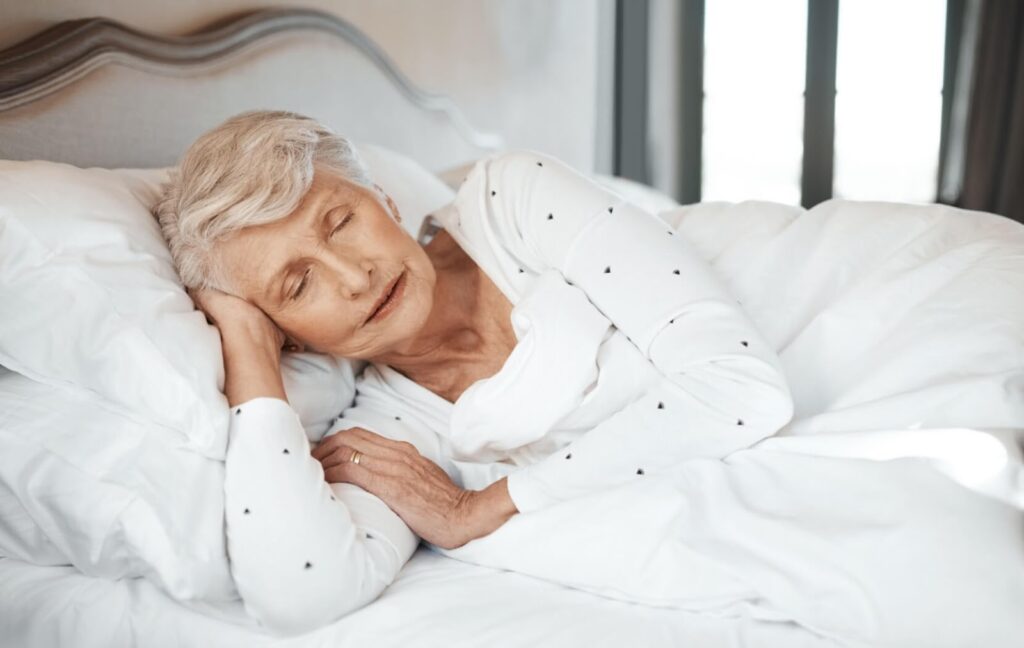It’s no secret that our sleeping patterns change as we age. Whether it’s sleeping in or long naps during the day, it may seem like older adults in our lives longer than they ever did in the past. It turns out, it’s normal for older adults to sleep less at night leading to them spending more time sleeping during the day.
Some reasons the older adult in your life might be sleeping more include:
- Natural changes in their sleeping patterns
- Health conditions that affect sleep
- Medications and side effects that affect sleep
- Lifestyle changes after retirement
It’s important to encourage your loved one to practice good sleep hygiene, whether that’s socializing enough or setting up a good sleep environment.
Natural Changes in Sleep Patterns
One of the most significant reasons older adults sleep more is due to the natural aging process. Sleep cycles can change significantly over the years.
- Lighter sleep cycles: Older adults spend less time in the deep, restorative stages of sleep. This can lead to more awakenings at night, leaving them less refreshed in the morning.
- More fragmented sleep: Frequent awakenings can occur due to age-related body changes or environmental factors, like physical discomfort or noise sensitivity. This can result in daytime fatigue and an increased need for naps or sleeping in to compensate.
While these changes are natural, they can still interfere with an older adult’s quality of life. A consistent and nurturing routine can make a big difference in managing these disruptions.
Health Conditions That Affect Sleep
Sleep challenges can often be linked to common health conditions in older adults. Identifying and addressing these underlying factors is key to promoting restful, quality sleep.
- Chronic physical conditions: Conditions like diabetes, heart disease, or respiratory issues can cause discomfort, making it difficult to stay asleep or rest uninterrupted.
- Neurological disorders: Alzheimer’s disease, Parkinson’s disease, and other forms of dementia can significantly impact sleep patterns, leading to daytime fatigue and irregular rest cycles.
Medications & Side Effects
Older adults often rely on medications to manage chronic conditions. Unfortunately, the side effects of these drugs can include drowsiness, trouble falling asleep, or difficulty staying asleep.
For instance, certain antihypertensives or medications for depression and anxiety may cause both sleep disruption and excessive fatigue. That’s why it’s important to regularly review medication plans with healthcare providers to explore dosages that work best for you or your loved one.
Lifestyle Changes in Later Years
With retirement, older adults often find themselves adjusting to less structured lifestyles. However, this shift can significantly affect sleep by:
- Irregular sleep patterns: Without the demands of a 9-to-5 routine, it’s common for older adults to fall into irregular sleep cycles such as staying up too late, sleeping in, or taking frequent naps.
- Reduced physical and social activity: Lower levels of physical exercise and less social interaction can lead to feelings of lethargy, which may increase the need for daytime rest.
Encouraging seniors to engage in physical and social activities whenever possible is great for maintaining an active lifestyle and balanced energy levels.
How to Improve Sleep Quality in Seniors
While some changes in sleep habits are unavoidable with aging, there are ways to improve sleep quality and support healthier routines for older adults. Seniors should aim for seven to nine hours of sleep a night.
1. Maintain a Consistent Sleep Schedule
Encourage older adults to go to bed and wake up at the same time every day, even on weekends. A consistent routine helps regulate their internal body clock.
2. Create a Restful Sleeping Environment
A bedroom that’s cool, dark, and quiet promotes optimal sleep. Comfortable bedding and a supportive mattress can also make a big difference. Consider blackout curtains or sleep masks to minimize disturbances.
3. Limit Daytime Naps
Short naps of 20–30 minutes can provide a refreshing boost without interfering with nighttime sleep. Encourage naps earlier in the afternoon rather than late in the day.
4. Encourage Regular Physical Activity
Light exercises like walking, yoga, or swimming can reduce stress and improve sleep. Scheduling these earlier in the day minimizes overstimulation before bedtime.
5. Be Mindful of Diet & Hydration
Avoid heavy meals, caffeinated drinks, or alcohol a few hours before bed. Encourage hydrating earlier in the day to reduce nighttime bathroom interruptions.
6. Seek Professional Guidance
If sleep challenges persist, work with a healthcare provider who specializes in sleep disorders. They can assess potential medical causes and offer treatments or therapies tailored to your loved one’s needs.
Supporting Restful Sleep for Older Adults
At Liana of Venice, we believe that quality sleep creates the foundation for a vibrant and fulfilling life. Our care programs focus on enhancing physical and mental well-being and helping seniors feel energized and refreshed.
Here’s how we promote healthy sleep for our residents:
- Personalized care and medication management: Our experts work closely with healthcare providers to monitor medications, identify potential sleep disruptors, and maintain a consistent care plan.
- Structured daily routines: We provide engaging activities, meaningful social interactions, and regular schedules to balance energy levels throughout the day. This can naturally promote better sleep at night.
- Comfortable living spaces: Our tranquil and well-designed living spaces are equipped for ultimate comfort, ensuring a peaceful and restful atmosphere.
Prioritizing Sleep In the Golden Years
Supporting your loved one’s health and happiness is a team effort, and we’re here to help every step of the way. At Liana of Venice, we provide not only expert care but also a compassionate environment where seniors can rest, grow, and flourish.
Interested in learning more? Schedule a tour today to discover how we can help your loved one enjoy more restful nights.




